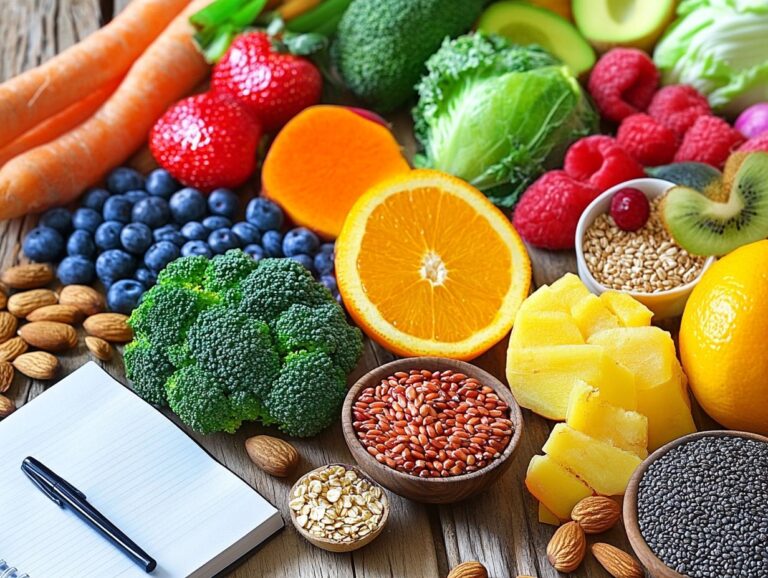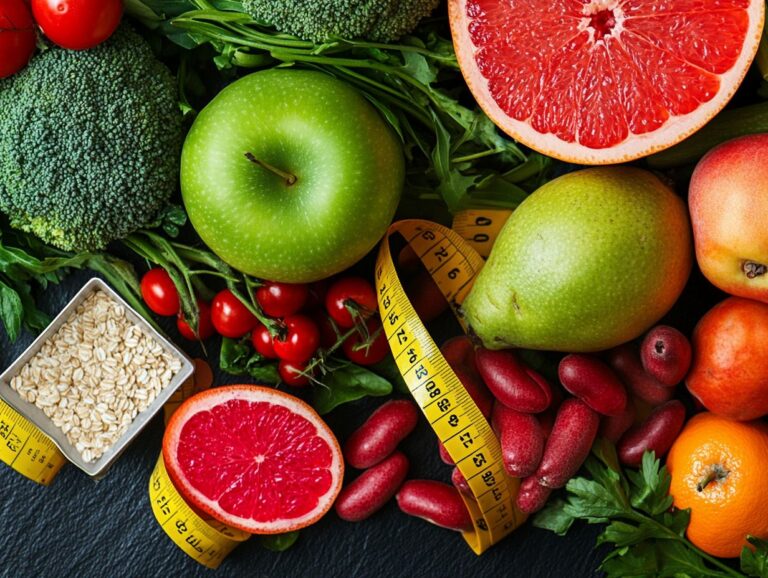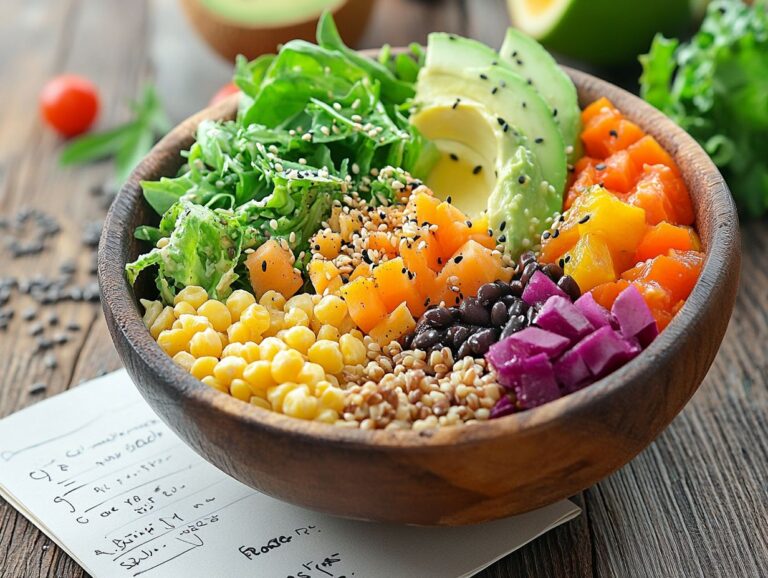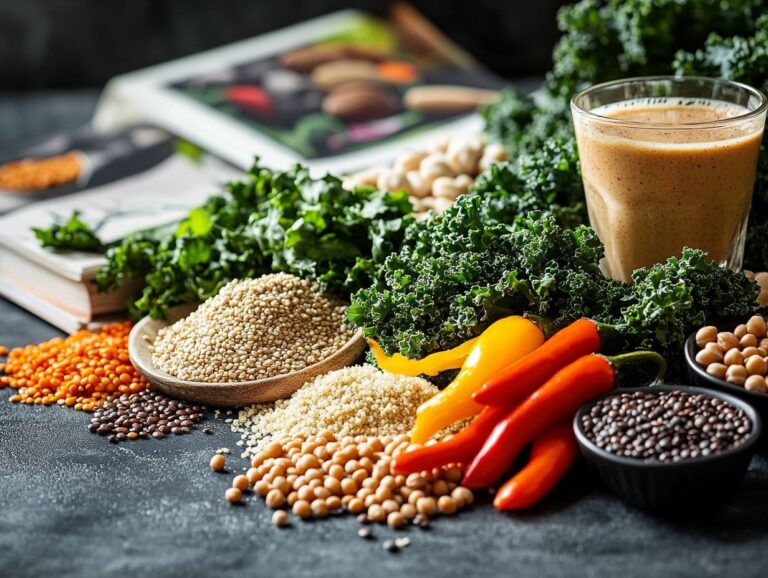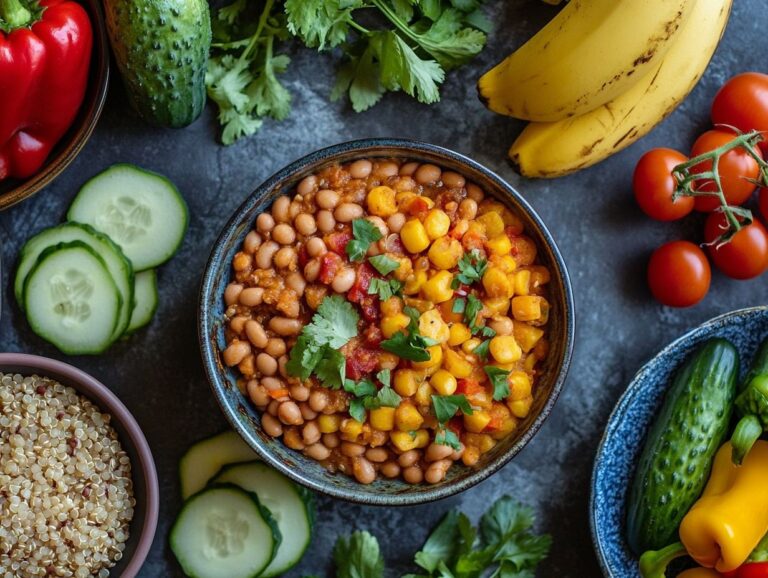Are you curious about how to optimize your health through food choices and a plant-based diet? The alkaline vegan diet plan might be just what you need.
This approach focuses on plant-based eating and emphasizes balancing your body’s pH levels for improved well-being and wellness.
Explore the benefits of adopting an alkaline vegan diet, what foods to include or avoid such as acidic foods, and practical tips for creating your own plan.
Discover how this lifestyle can enhance your energy, digestion, and overall health, providing an energy boost and improved digestive health!
What Is an Alkaline Vegan Diet Plan?
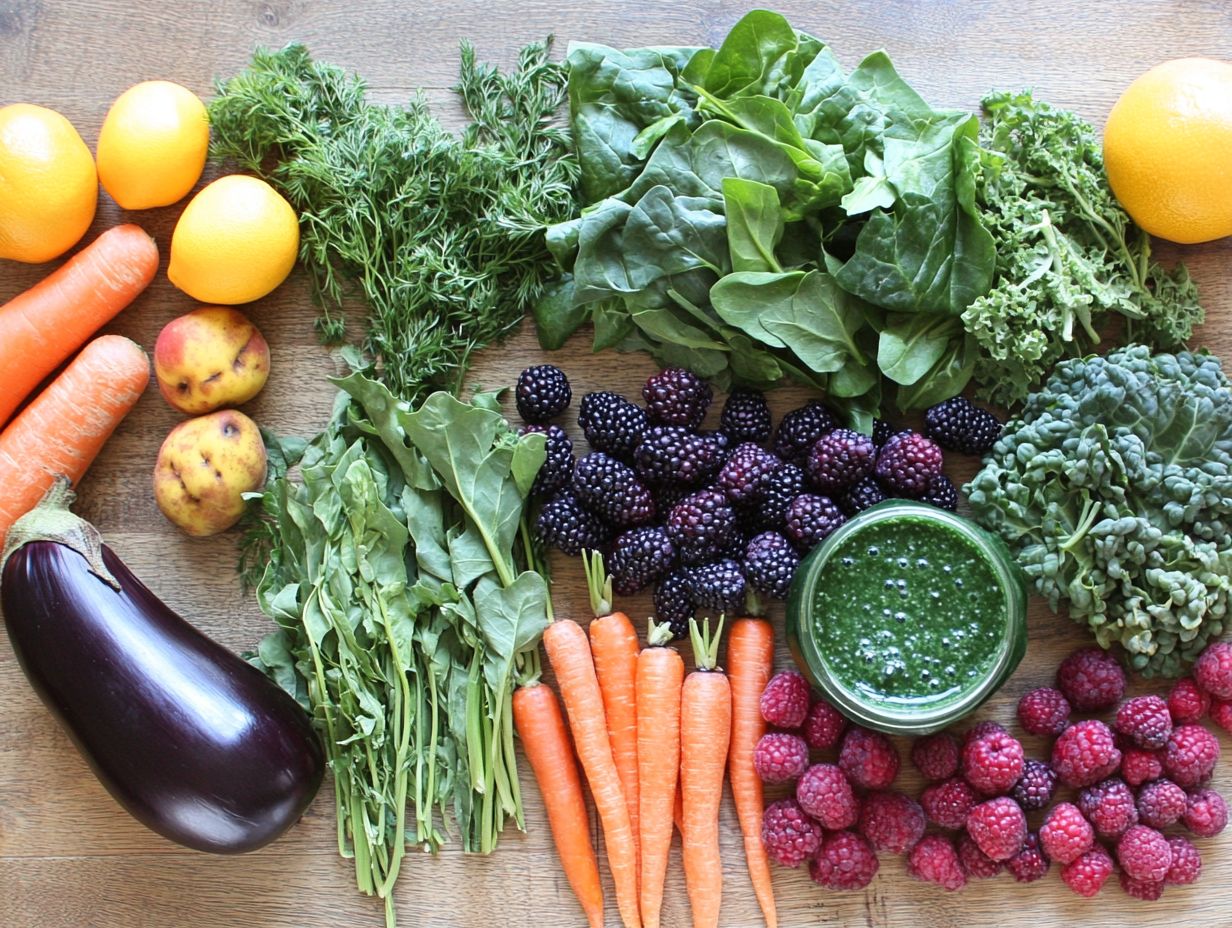
An alkaline vegan diet plan emphasizes the consumption of alkaline foods, primarily plant-based, to help maintain a healthy pH balance in the body.
This diet includes nutrient-dense options such as leafy greens, fresh vegetables, fruits, nuts, and legumes, while avoiding acidic foods and non-whole, processed options that can disrupt alkalinity.
By choosing an alkaline vegan diet plan, individuals not only benefit from a varied meal selection but also adopt healthy eating habits that promote overall wellness and sustainable weight loss.
What Are the Benefits of an Alkaline Vegan Diet Plan?
The alkaline vegan diet plan offers numerous health benefits that can significantly enhance overall well-being.
This diet promotes a healthier pH balance, supports weight loss, improves digestive health, and reduces inflammation. Additionally, the alkaline vegan diet encourages a healthy lifestyle, boosts immune function, and helps prevent chronic diseases, making it a popular choice among many celebrities and health-conscious individuals.
1. Balances pH Levels
The primary benefit of alkaline vegan diets is their ability to balance pH levels throughout the body, which is essential for good health.
These diets emphasize the consumption of alkaline foods, such as fruits, vegetables, nuts, and seeds, which are believed to reduce acidity in the body. Excess acidity is associated with various health issues, including inflammation and chronic diseases.
By incorporating more alkaline options into their daily meals, individuals can promote a more favorable internal environment that may enhance immune function and overall well-being.
Additionally, an alkaline vegan diet is rich in nutrient-dense foods and antioxidants, which play a crucial role in reducing oxidative stress and further supporting a healthy pH balance and immune function.
2. Promotes Weight Loss
The alkaline vegan diet is effective for weight management because it emphasizes the consumption of nutrient-rich foods that are typically lower in calories. By focusing on whole fruits, vegetables, nuts, and seeds, individuals can enjoy satisfying snacks and meals that help curb hunger while enriching the body with essential vitamins and minerals.
This approach facilitates the creation of a calorie deficit necessary for weight loss while maintaining energy levels. Additionally, alkaline foods help reduce inflammation and promote overall wellness, making this diet an appealing choice for those seeking sustainable results.
Incorporating options such as leafy greens, avocados, and legumes can transform daily eating habits, ultimately leading to a healthier lifestyle and a significant improvement in one’s sense of vitality and healthy living.
3. Increases Energy Levels
An alkaline vegan diet significantly enhances energy levels by incorporating fresh, nutrient-dense foods that nourish the body.
By focusing on alkaline-forming foods, such as vibrant leafy greens and a diverse selection of fresh fruits, individuals can experience not only increased vitality but also improved overall physical activity.
These foods are packed with vitamins, minerals, and antioxidants that support optimal bodily functions. Leafy greens like spinach and kale are particularly rich in chlorophyll, which aids in detoxifying the body and promoting better oxygen flow, ultimately having a direct impact on stamina.
Additionally, the natural sugars found in fruits provide a readily accessible yet sustained source of energy, making it easier to stay active throughout the day while reducing fatigue.
4. Improves Digestion

Improved digestion is another benefit of the alkaline vegan diet, which is rich in fiber from fruits and vegetables that support digestive health. These essential components promote regular bowel movements and contribute to a healthy microbiome, both of which are crucial for overall well-being.
Leafy greens, avocados, and brightly colored berries are particularly notable for their antioxidants and phytonutrients, which enhance detoxification and can significantly benefit digestive health. A balanced intake of fibrous foods helps cleanse the digestive tract, reducing bloating and discomfort while also improving nutrient absorption.
What Foods Are Included in an Alkaline Vegan Diet Plan?
An alkaline vegan diet plan consists of consuming a diverse range of alkaline foods, such as fruits, vegetables, whole grains, plant-based protein sources, and healthy fats.
This combination helps to maintain healthy pH levels in the body.
1. Fruits and Vegetables
Fruits and vegetables are the cornerstone of an alkaline vegan diet, offering a variety of nutrients and alkalizing properties that promote overall health.
Leafy green vegetables, such as spinach, kale, and Swiss chard, are particularly rich in vitamins A, C, and K, and they also provide essential minerals like calcium and magnesium. These greens help maintain the body’s pH balance and reduce inflammation.
Additionally, fruits like avocados, tomatoes, and citrus fruits (such as lemons and limes) are high in potassium and antioxidants. These alkaline-forming foods contribute to detoxification, enhance digestion, and support cardiovascular health, making them vital components of a balanced, nutrient-rich diet.
2. Whole Grains
Whole grains, such as quinoa and brown rice, are essential components of the alkaline vegan diet, as they provide both fiber and vital nutrients.
These grains not only enhance energy levels but also promote digestive health due to their high fiber content, which supports regular bowel movements and a healthy gut microbiome.
Additionally, the protein content of whole grains helps with weight management by increasing feelings of fullness, allowing individuals to feel satisfied for longer and reducing the likelihood of unhealthy snacking.
The vitamins and minerals present in whole grains contribute to overall well-being, making them a crucial part of a balanced meal plan and addressing potential nutritional gaps.
Furthermore, whole grains offer a delicious way to meet nutritional needs while following an alkaline lifestyle.
3. Plant-Based Proteins
Plant-based proteins, such as legumes and nuts, are essential components of an alkaline vegan diet, providing necessary amino acids while maintaining alkalinity.
These protein sources support muscle growth and repair, while also contributing to overall health by offering essential nutrients, fiber, and healthy fats.
Incorporating foods like quinoa, chia seeds, and spirulina can significantly boost the protein content of meals and enhance their nutrient density.
For those following this dietary approach, well-planned meal strategies can easily incorporate these proteins into smoothies, salads, or main dishes, ensuring a balanced intake that promotes wellness, vitality, and dietary-induced pH.
Exploring various combinations can maximize the benefits of these proteins, allowing individuals to enjoy a diverse array of flavors while adhering to their alkaline lifestyle.
4. Healthy Fats
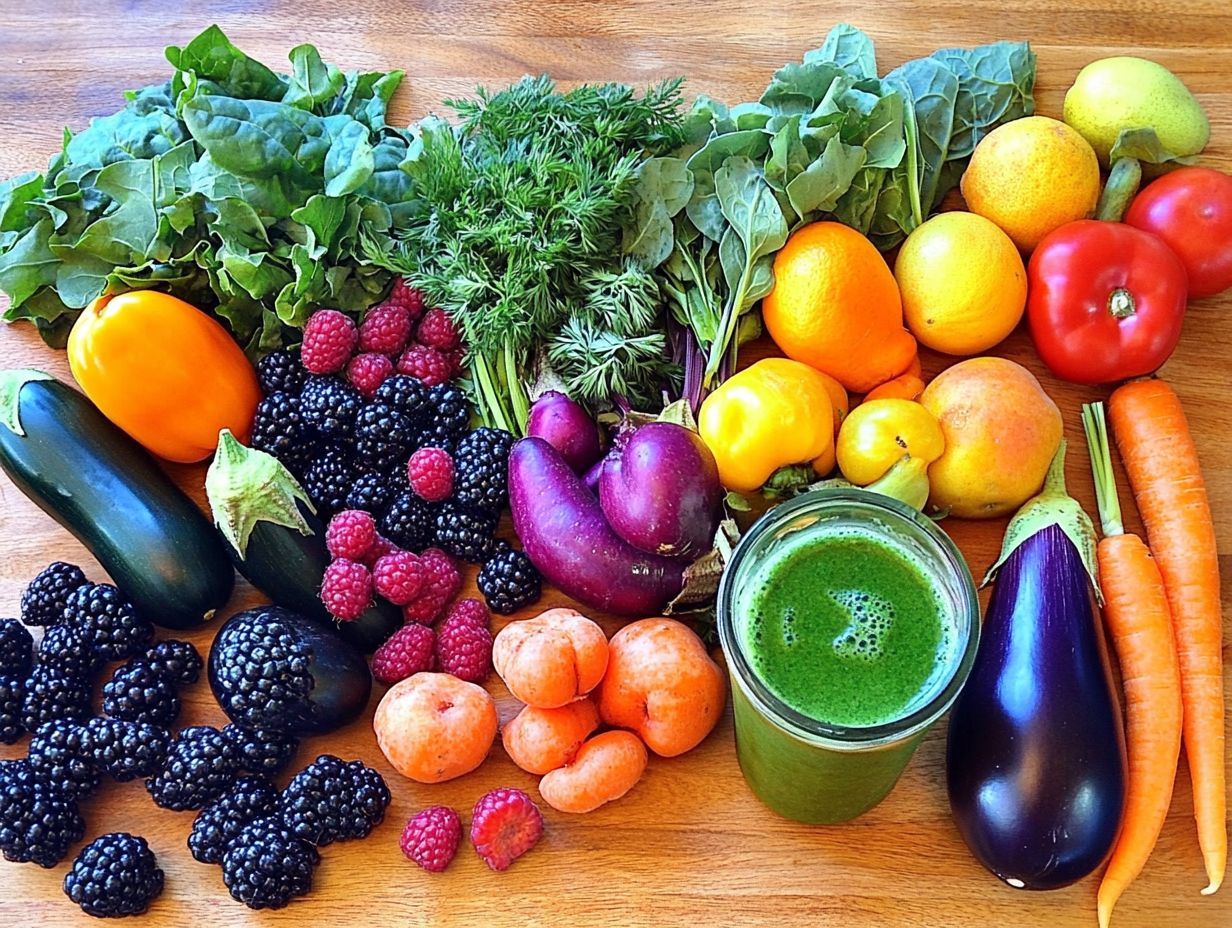
Healthy fats, such as omega-3 fatty acids found in flaxseeds and walnuts, play a crucial role in an alkaline vegan diet by supporting cellular health and overall wellness.
These healthy fats enhance the bioavailability of fat-soluble vitamins A, D, E, and K. Incorporating sources of healthy fats into an alkaline vegan diet not only provides energy but also reduces inflammation and promotes heart health.
Regularly using healthy fat sources like olive oil and hemp seeds in meals boosts the nutrient density of the alkaline diet and ensures that the body receives a balanced intake of essential fatty acids.
The synergistic effects of these nutrients enhance the alkaline lifestyle, contributing to increased vitality, diet sustainability, and long-term wellness.
What Foods Should Be Avoided in an Alkaline Vegan Diet Plan?
An alkaline vegan diet plan focuses on avoiding specific foods, particularly processed foods, animal products, and refined sugars, to maximize health benefits and maintain an optimal pH balance.
1. Processed Foods
Processed foods can be detrimental to an alkaline vegan diet because they often contain unhealthy additives and preservatives that contribute to acidity. These refined products typically have high levels of sugar, salt, and unhealthy fats, which can disrupt the body’s pH balance and lead to various health issues, including inflammation and chronic diseases.
In contrast to whole foods, which are rich in vitamins, minerals, and antioxidants, processed alternatives lack the essential nutrients required for optimal bodily function. Whole foods, such as fruits, vegetables, legumes, and grains, not only nourish the body but also promote an alkaline environment, aiding digestion and supporting overall health.
By prioritizing natural, nutrient-dense options, individuals can significantly improve their well-being and mitigate the adverse effects of processed dietary choices.
2. Animal Products
An alkaline vegan diet excludes animal products because they are acidic and can hinder the body’s ability to maintain an optimal pH balance.
Consuming these acidic foods can lead to increased acidity levels in the body, resulting in various issues such as inflammation, digestive health problems, and decreased energy levels. Elevated acidity can put stress on the body’s organs, requiring them to work harder to achieve optimal health and pH balance.
However, adopting a vegan and alkaline diet offers numerous health benefits, including improved digestion, increased energy, and a reduced risk of chronic diseases. By focusing on fruits, vegetables, nuts, and seeds, individuals can ensure adequate intake of essential nutrients while promoting overall wellness through a more balanced pH environment. This approach also supports immune function and sustainable weight loss.
3. Refined Sugar
The second most harmful food for an alkaline vegan diet is refined sugar, as it increases inflammation and disrupts the body’s pH levels. When consumed in high amounts, refined sugar not only contributes to chronic diseases such as obesity and diabetes but also impairs the body’s ability to maintain a balanced alkaline state. Additionally, it can lead to significant health risks and undermine weight management efforts.
An alkaline vegan diet aims to optimize health by promoting whole, nutrient-dense foods and minimizing or eliminating processed foods. Refined sugars, primarily found in sweetened beverages and packaged snacks, can create acidic by-products in the body, undermining the health benefits of the diet. This dietary approach emphasizes the importance of consuming alkaline-forming foods to support overall wellness and detoxification.
As a result, individuals following this diet may inadvertently counteract its benefits, leading to fatigue, mood swings, and other digestive issues stemming from excessive sugar consumption.
4. Caffeine and Alcohol
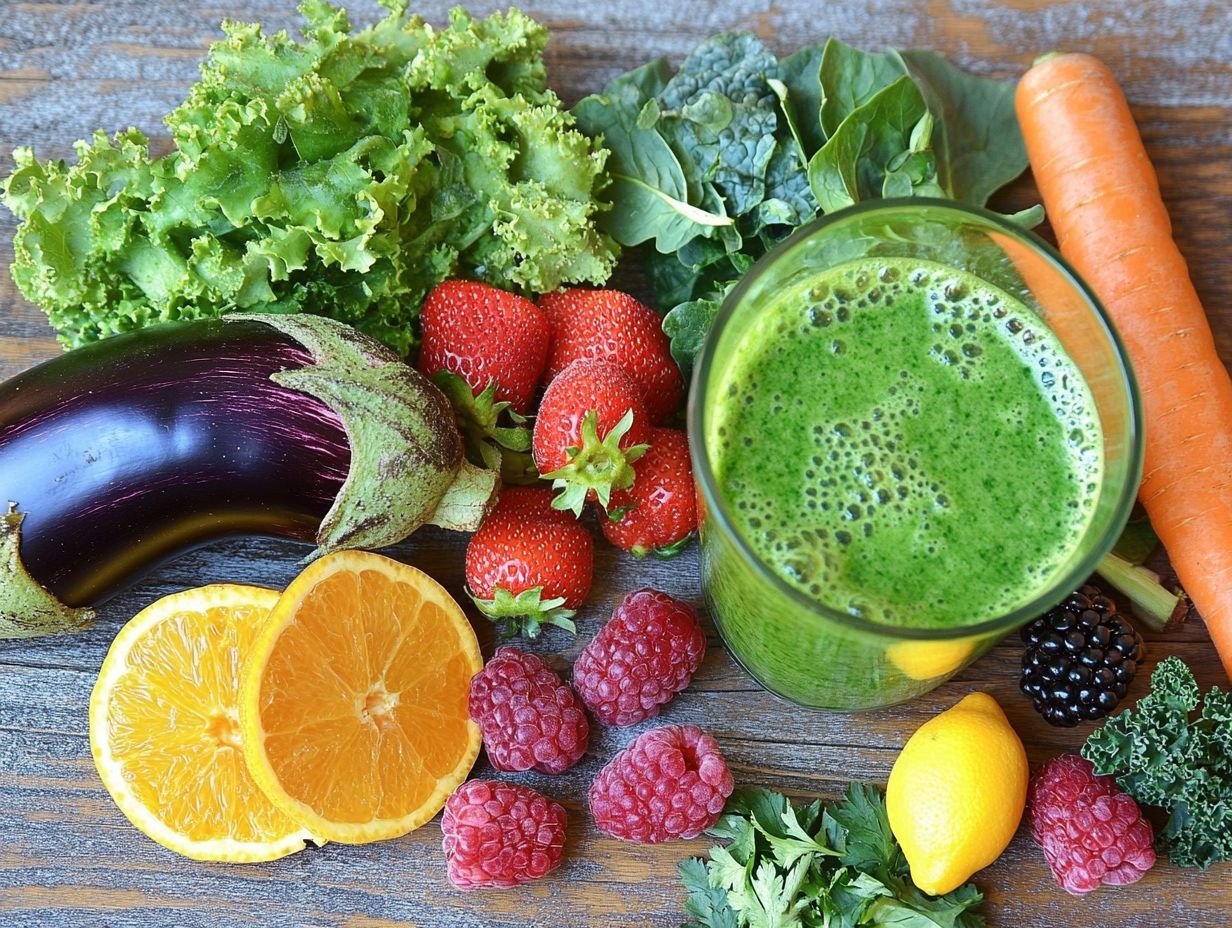
Caffeine and alcohol should be avoided in an alkaline vegan diet because they can lead to dehydration and disrupt the body’s natural pH balance. The consumption of caffeine and alcohol may increase acidity levels in the body, negatively impacting overall health and vitality.
Caffeine possesses diuretic properties, which can cause the body to lose essential fluids and electrolytes. Similarly, alcohol consumption can disrupt fluid balance and hinder the body’s ability to maintain a stable internal environment.
Instead, consuming hydrating liquids such as herbal teas, coconut water, and alkaline water can promote adequate hydration and support the body’s natural alkalinity. Additionally, smoothies made from leafy green vegetables, fruits, and other fresh vegetables offer a delicious and refreshing way to boost hydration while perfectly complementing an alkaline vegan diet. This practice aids in achieving an energy boost and improved immune function.
How to Create an Alkaline Vegan Diet Plan: Tips for Healthy Living
An alkaline vegan diet plan should consist of thoughtful food selections, appropriate preparation methods, and an emphasis on fluid intake to ensure a well-balanced nutrient profile.
1. Start with a Balanced Plate
A balanced plate is essential in an alkaline vegan diet, comprising a variety of alkaline foods that contribute to the overall health and well-being of those who follow this dietary approach. This method emphasizes achieving harmony among different food groups while prioritizing nutrient-dense options.
A balanced plate should include a colorful assortment of vegetables, whole grains, legumes, nuts, and seeds, all of which are crucial for maintaining the body’s ideal pH level. For instance, filling half the plate with leafy greens and vibrant vegetables ensures an adequate intake of micronutrients.
Allocating one-quarter of the plate to whole grains, such as quinoa or brown rice, provides necessary macronutrients. The final quarter should include healthy fats from sources like avocados or nuts, ensuring that meals are balanced and promote vitality and longevity.
This approach not only enhances flavor but also encourages a diverse range of nutrients, promoting overall wellness and diet sustainability.
2. Incorporate a Variety of Foods
The benefits of an alkaline vegan diet are maximized by consuming a diverse range of foods, which exposes individuals to a variety of essential nutrients. Including a wide array of foods enhances the taste of the alkaline vegan diet and increases the likelihood of receiving all necessary vitamins and minerals in appropriate levels.
Incorporating different fruits alongside vegetables provides important antioxidants and boosts the overall nutrient density of the diet. Whole grains and plant-based proteins contribute essential amino acids, further promoting a balanced dietary pattern.
A diverse selection of food choices supports digestion, boosts energy levels, and may even enhance mental clarity. Incorporating fruits and vegetables, whole grains, legumes, and healthy fats ensures that dietary gaps are filled with nutrient-dense options. These components of complete nutrition are vital for individuals aiming to maintain a healthy lifestyle while adhering to alkaline principles.
3. Plan Meals and Snacks Ahead of Time
Meal and snack planning is a crucial strategy for maintaining an alkaline vegan diet and minimizing the chances of consuming non-alkaline foods. Setting aside a few hours each week to create a detailed meal plan is essential for those following an alkaline vegan lifestyle, as it allows for the collection of a diverse range of recipes that meet nutritional needs. Planning also helps manage dietary restrictions and ensures that nutrient-dense foods are readily available.
This practice helps reduce the risk of making hasty food choices during busy periods or at social gatherings, ensuring that healthy snacks are readily available throughout the week. It is important to plan ahead, so having a variety of options for salads, smoothies, and energy bites prepared and stored in containers is advisable.
Ingredients like leafy greens, nuts, and seeds are effective for maintaining energy levels, and having pre-portioned healthy snacks can help curb unhealthy cravings. Successful meal planning relies on organization and creativity, utilizing a diverse range of nutrient-rich foods and recipes!
4. Listen to Your Body: Insights from Celebrities
Listening to your body is crucial when following an alkaline vegan diet, as it helps you identify food preferences and potential dietary restrictions. This mindful approach also takes into account diet sustainability and the importance of adapting dietary habits to individual needs.
Being aware of your emotional and physical responses to different foods allows you to create the most personalized and effective version of any diet. Adapting to the alkaline vegan lifestyle requires an understanding of how various foods affect your body and mind, including the role of dietary-induced pH changes and the benefits of alkaline recipes.
Individuals should pay attention to how certain ingredients influence their energy levels, digestion, and mental clarity. This awareness fosters a balanced approach to eating that aligns dietary choices with specific health benefits, such as increased energy and reduced inflammation.
By embracing this adaptability, you can maximize the benefits of an alkaline vegan diet while recognizing the importance of an overall healthy lifestyle. Celebrities like Victoria Beckham and Tom Brady have also endorsed the alkaline lifestyle for its health benefits and the role it plays in their plant-based diet choices.
